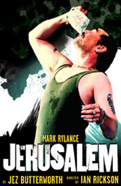Jerusalem Playwright Jez Butterworth on the Englishness of His Work, the Tonys and Writing for Mark Rylance
About the author:
Accomplished British scribe Jez Butterworth’s works Parlour Song, The Night Heron and Mojo have received New York mountings, but Jerusalem marks his first Broadway production. The show and its headliner, Tony winner and current nominee Mark Rylance, has earned raves for its quirky storyline and staging. Here, Butterworth recalls crafting the outlandish character of Johnny "Rooster" Byron (played by Rylance), the joys of bringing an English company to America, and his reaction to the show’s Best Play Tony nomination.
![]()
I’ve met several characters like Jerusalem’s Johnny "Rooster" Byron in my life. He’s a very identifiable type—not just in England, but in America as well. I’ve lost count of how many people have come up to me and said, "I know that guy! He lived near me growing up." Like Johnny, there are many figures that exist on the fringes of communities and occupy morally and socially gray areas. They’re attractive characters, so people are drawn to them but appalled at the same time. That struck me as a very dramatic idea.
Writing for Rooster was a strange experience. It’s funny, once you tap into a voice, words just start to flow. You know when you’ve hit a spirit or captured something. It takes you away like a runaway train, and you have to hang on for dear life. Mark Rylance, who plays Johnny, read a very early draft of the play before we’d ever met. I’d never even seen him act. Even if he didn’t end up playing this role, the show would’ve never been the same without him. Mark came to my farmhouse in Somerset with our director Ian Rickson and we went to a May Day festival together. That night we sat around a fire and Mark read Ted Hughes poetry. It just gave me chills. He was extraordinary. Over the next months as I was writing the play, I was trying to get into that register where he gave me goosebumps as I witnessed him reciting those poems. It was like he was saying, “I can do this so you better arm me with something compelling.”
Jerusalem is set in a town called Flintlock, which I modeled off a village where I had lived. The village had a big harvest festival every year in the fall, but I decided to transport the play to the spring on St. George’s Day because it’s more of an English day, one of the closest things we have to a national holiday. I’m English and love England. Whenever I’m there, I’m always seeing the present but feeling its past. When you walk down the street in London, not only have you walked down that same street 20 years before yourself, but people have walked down it hundreds or even a thousand years before. You can see history written everywhere. I think that duality of time resonates with everyone. We exist in time, but we have a relationship with the past. “Time” is even the first word spoken in the play.
The experience of being in a Broadway theater as an English troupe has been fantastic. The Music Box Theatre is the nicest space we’ve ever done the show in. I love how the show sounds in there. It’s like music; it just has this kind of rhythm to it. The show was such a success in London, so I wasn’t nervous to bring it to New York. I’m amazed when anything that I write works for even 10 minutes. That’s what makes live theater exciting for me. We don’t know if today’s matinee will work or if the evening performance will— it’s always up for grabs.
It’s also thrilling to be nominated for the Tony Award. I understood very little about the significance of the Tony before, but I’ve learned that it makes a huge significance to whether or not your show is going to run. Anything that keeps this show going is good. The actors in the play were all involved in creating this show two years ago. A lot of them got on planes for the first time to come here, so the idea that they would have had to go home with tails between their legs if we failed, for me, would have been a disaster. So to see this show work is such a joy. It’s a surprise, but one that I’m happy to witness.

